Dental Implants
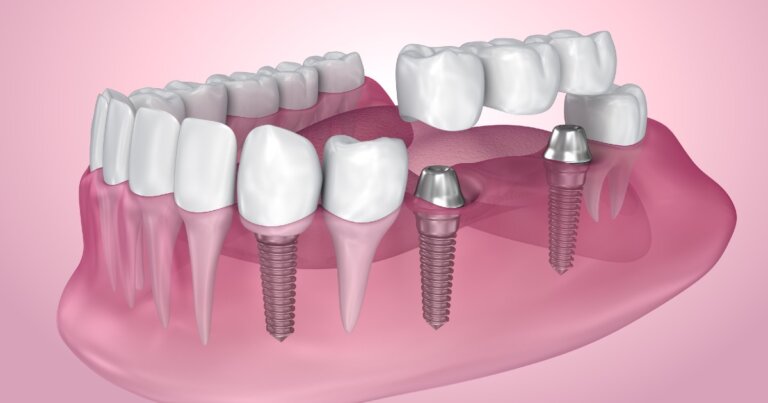
What are Dental Implants?
Dental Implants are revolutionary replacements for missing teeth that not only look and feel like natural teeth but also function just as efficiently. Designed to fuse seamlessly with your jawbone, these small yet robust fixtures provide a stable foundation for dental restorations, such as crowns, bridges, or dentures. Whether you’ve lost a single tooth or multiple ones, dental implants can be tailored to suit your unique needs, ensuring a smile that is both aesthetically pleasing and functional.
Unlike traditional dental solutions, such as removable dentures or fixed bridges, dental implants offer a long-lasting and durable option for tooth restoration. The secret lies in their composition, which typically consists of three main components:
- Implant Post: Made from biocompatible materials like titanium, the implant post serves as an artificial tooth root. Surgically placed into the jawbone, it integrates with the surrounding bone over time through a process called osseointegration, ensuring a solid and permanent foundation for the restoration.
- Abutment: The abutment acts as a connector between the implant post and the dental restoration. This small connector sits above the gum line and provides a stable anchor for attaching the artificial tooth or crown securely.
- Implant Crown: The final piece of the puzzle is the dental restoration, which can vary depending on your specific needs. Whether it’s a single crown to replace one tooth or a bridge or denture for multiple missing teeth, the dental restoration is custom-made to blend seamlessly with your existing teeth, ensuring a natural and harmonious smile.
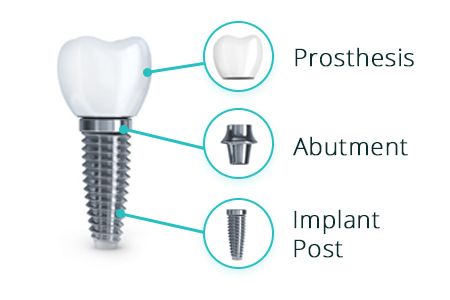
Dental implants have undoubtedly transformed the field of restorative dentistry, offering a permanent and life-changing solution for those with missing teeth. Before you deciding on whether Dental Implants are right for you, there are some things you should know:
- Who Needs Dental Implants?
- What Are The Advantages Of Dental Implants?
- What Are The Potential Risks Or Complications Of Dental Implants?
- Which Dental Implant Brand Should I Choose?
- What Are The Alternative Treatments If I Do Not Choose Dental Implants?
- How Much Do Dental Implants Cost?
- What Are The Steps In The Dental Implants Procedure?
- Can I Have Dental Implants If I Am Pregnant?
- How Long Do Dental Implants Last?
If you have any further questions about Dental Implants or other dental services offered at Atlas Dental, please contact us.

Free phone consultation
Have questions about dental implants? Schedule a free phone consultation with our Toronto dentist.

5 star google reviews
Our patients love us! See for yourself why people are choosing Atlas Dental in Toronto for dental implants.

Dental Implant Emergency service
Broke a tooth and need a dental implant? Book an emergency appointment today.
Who Needs Dental Implants?
Dental implants are a remarkable dental innovation that can benefit a wide range of individuals dealing with tooth loss or other dental conditions. If you find yourself in any of the following situations, dental implants might be the ideal solution for restoring your smile and improving your quality of life.
- Individuals with Missing Teeth: Dental implants are an excellent option for people who have lost one or more teeth due to various reasons, such as dental decay, gum disease, or dental trauma. Whether you’re missing a single tooth or multiple teeth, implants can provide a stable and long-lasting replacement, effectively filling the gaps in your smile.
- Those Seeking a Permanent Tooth Replacement: Unlike traditional dentures, which may require frequent adjustments and replacements, dental implants offer a fixed and permanent solution. The implant post’s integration with the jawbone ensures a secure foundation for the restoration, eliminating worries about slipping dentures or discomfort during speech and eating.
- Individuals with Failing Teeth: If you have severely damaged or decayed teeth that cannot be restored through conventional dental procedures, dental implants can be an effective alternative. Rather than undergoing repeated treatments, opting for dental implants can be a one-time investment in your oral health.
- Patients with Unstable Dentures: For individuals who currently wear removable dentures and experience difficulties with stability or discomfort, dental implants can offer a life-changing improvement. Implant-supported dentures provide a secure fit, reducing irritation to the gums and enabling you to enjoy your favorite foods without constraints.
- Those Looking to Preserve Jawbone Health: When you lose a tooth, the underlying jawbone can begin to deteriorate due to lack of stimulation. Dental implants prevent this bone resorption by stimulating the jawbone, preserving its density and structure. This essential benefit helps maintain facial aesthetics and prevents the sunken appearance that often accompanies missing teeth.
- Patients with Healthy Gums and Adequate Bone Density: For dental implants to be successful, having healthy gums and sufficient bone density is crucial. Before proceeding with the implant procedure, your dentist will evaluate your oral health and jawbone structure to ensure you are a suitable candidate for dental implants.
- Those Seeking Natural-Looking Results: Dental implants offer a natural-looking and seamless smile restoration. The dental restorations are customized to match the color, shape, and size of your existing teeth, creating a harmonious and attractive smile that boosts confidence and self-esteem.
- Individuals Committed to Oral Hygiene: To ensure the long-term success of dental implants, maintaining good oral hygiene is essential. Individuals willing to commit to regular dental check-ups, daily brushing and flossing, and following their dentist’s recommendations are more likely to enjoy the full benefits of their dental implants for many years to come.
Dental implants are a versatile and transformative dental treatment suitable for a wide range of individuals dealing with tooth loss or other dental conditions. If you have missing teeth, unstable dentures, or are seeking a permanent solution for tooth restoration, dental implants may be the answer you’ve been looking for. However, it’s crucial to consult with a qualified dental professional to assess your specific dental needs and determine if dental implants are the right option for you. If you have further questions about Dental Implants, please contact us.
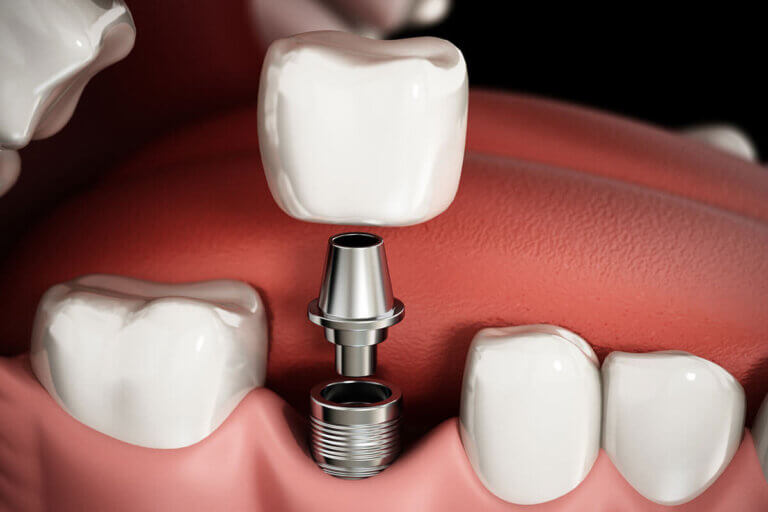
What Are The Advantages Of Dental Implants?
Dental implants offer a plethora of advantages that make them a top-notch choice for individuals seeking effective tooth replacement solutions. These remarkable dental marvels go beyond merely restoring your smile; they bring a host of benefits that significantly impact your oral health, overall well-being, and self-confidence.
- Natural-Looking and Feeling: One of the most significant advantages of dental implants is their ability to mimic the appearance and function of natural teeth flawlessly. The dental restorations, such as crowns, bridges, or dentures, are custom-made to match the color, shape, and size of your existing teeth, creating a harmonious and authentic smile. As they are firmly anchored in the jawbone, implants provide a stable bite, allowing you to chew and speak with confidence, just as you would with your natural teeth.
- Long-Lasting and Durable: Dental implants are designed to stand the test of time. With proper care and regular dental check-ups, implants can last for many years, even a lifetime. Unlike traditional dental solutions that may require frequent repairs or replacements, dental implants offer a cost-effective and long-term investment in your oral health.
- Preserves Jawbone Health: When a tooth is lost, the underlying jawbone may begin to deteriorate due to lack of stimulation. Dental implants play a crucial role in preserving jawbone health by stimulating the bone through chewing forces, just like natural teeth. This stimulation promotes bone density and structure, preventing the bone from resorbing, and helps maintain the integrity of your facial features.
- Restores Oral Function: Dental implants enable you to enjoy your favorite foods without limitations, as they provide a stable and robust chewing surface. Unlike removable dentures that may slip or cause discomfort while eating, dental implants offer optimal oral function, making dining a pleasurable experience once again.
- Improves Speech: Missing teeth or ill-fitting dentures can affect your ability to speak clearly. Dental implants eliminate speech impediments by providing a stable foundation for dental restorations. Restored confidence in your speech can significantly enhance communication and social interactions.
- Enhanced Comfort and Convenience: Dental implants become a seamless part of your oral anatomy, eliminating any discomfort or irritation that may arise from removable dentures. Since they are fixed in place, there is no need to remove them for cleaning or while sleeping, offering unparalleled convenience.
- Boosts Self-Confidence: Regaining a complete and beautiful smile can have a profound impact on self-esteem and self-assurance. With dental implants, you can smile, speak, and laugh without hesitation, allowing you to fully embrace your true self and feel more confident in both social and professional settings.
- Prevents Teeth Shifting: When a tooth is lost, the adjacent teeth may begin to shift or tilt into the empty space, causing misalignment and bite problems. Dental implants fill the gap, preventing the movement of neighboring teeth and maintaining the proper alignment of your bite.
Dental implants are undeniably a game-changer in the field of restorative dentistry, offering a multitude of advantages that extend beyond mere aesthetics. From their natural appearance and feel to their long-lasting durability and jawbone-preserving capabilities, dental implants provide a comprehensive solution for tooth loss. If you have further questions about Dental Implants, please contact us.
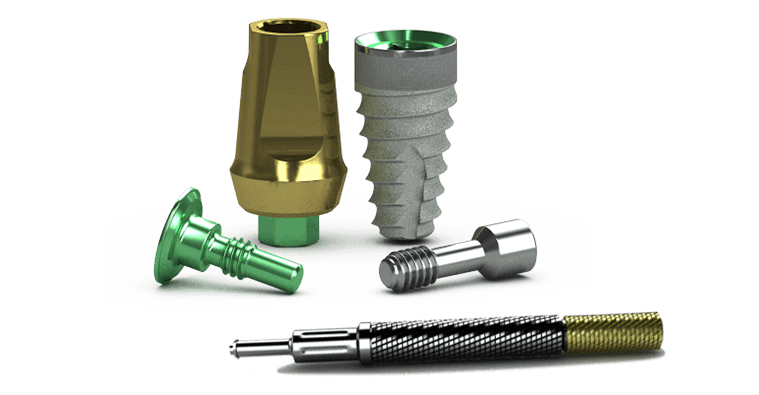
What Are The Potential Risks Or Complications Of Dental Implants?
While dental implants are a highly successful and widely practiced dental procedure, like any medical intervention, they do come with potential risks and complications. It is essential to be aware of these factors to make an informed decision about whether dental implants are the right choice for you. Your dentist will thoroughly evaluate your oral health and medical history to minimize these risks and ensure a successful outcome.
- Surgical Risks: The surgical placement of dental implants is generally safe, but as with any surgery, there are inherent risks. These risks may include infection, excessive bleeding, nerve damage, and injury to nearby structures. However, skilled and experienced dental professionals take necessary precautions to minimize these risks and ensure your safety during the procedure.
- Implant Failure: Osseointegration, the process where the implant post fuses with the jawbone, is vital for the success of dental implants. While dental implants are known for their long-term success, there is a small possibility of implant failure. Implant failure may occur shortly after the procedure or years later. Factors contributing to implant failure include infection, implant fracture, poor oral hygiene, and excessive biting forces. If an implant fails, it may need to be removed, and the area may require additional treatment before attempting another implant placement.
- Infection and Peri-Implantitis: Infections can occur at the implant site, just like with any surgical procedure. In some cases, an infection called peri-implantitis may develop, which is a severe inflammation of the tissues surrounding the implant. Peri-implantitis can cause bone loss and lead to implant failure if not treated promptly.
- Nerve Damage: During the implant placement, nearby nerves may be at risk of injury. Nerve damage can result in numbness or tingling in the lips, chin, tongue, or other areas of the mouth and face. Though rare, this complication can be a cause for concern and requires immediate attention if it occurs.
- Sinus Complications (For Upper Jaw Implants): For dental implants placed in the upper jaw, there is a risk of complications involving the sinus cavity. If the implant protrudes into the sinus cavity or causes sinus issues, additional treatment may be necessary to address the concern.
- Allergic Reactions: In very rare cases, some individuals may experience allergic reactions to the materials used in dental implants, such as titanium or certain components of the dental restoration. For these special circumstances, we offer zirconia dental implant alternatives.
While dental implants offer numerous advantages and have a high success rate, understanding the potential risks and complications is essential in making a well-informed decision about your dental treatment. The vast majority of patients undergo dental implant procedures without significant issues, and any risks are carefully assessed and minimized by experienced dental professionals. If you have further questions about Dental Implants, please contact us.
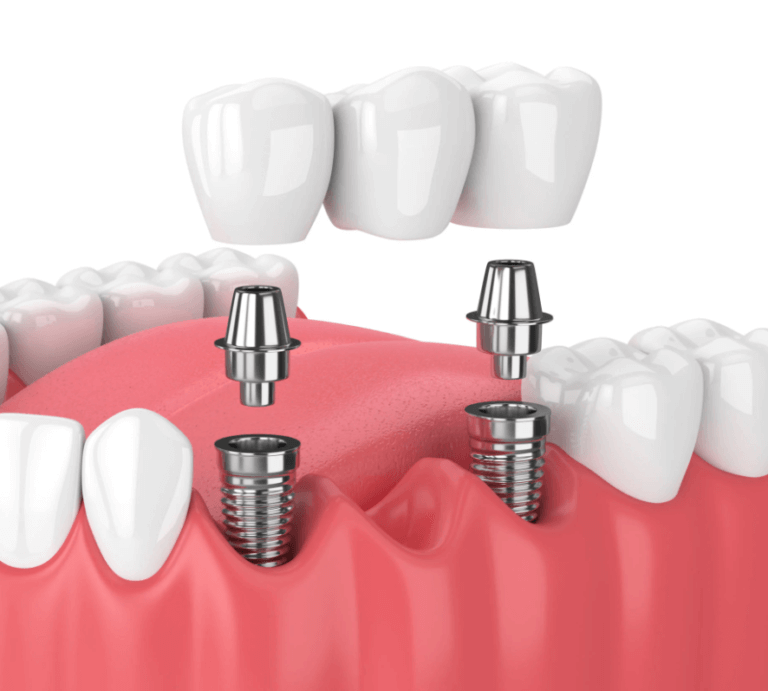
Which Dental Implant Brand Should I Choose?
There are many reputable dental implant brands and manufacturers to consider. Each brand offers its own range of implant systems, materials, and technologies. Here are some alternative dental implant brands that are well-regarded in the field of dental implantology:
- Ankylos: Ankylos, also part of Dentsply Sirona, is known for its reliable implant systems with a track record of success.
- Astra Tech: Astra Tech, part of Dentsply Sirona, is recognized for its high-quality implant systems known for precision and long-term success.
- BioHorizons: BioHorizons is an American dental implant company known for its innovative dental implant technologies, such as the Laser-Lok surface treatment, enhancing implant stability and tissue attachment. They offer various implant systems to suit different patient needs.
- Bicon: Bicon Dental Implants is an American company recognized for its innovative short dental implant system. Their unique design philosophy aims to simplify the implant placement process while providing reliable results.
- CAMLOG: CAMLOG is a Swiss implant manufacturer that offers a variety of implant systems, including the CAMLOG and CONELOG systems, known for their precision and clinical reliability. They focus on quality and precision in implantology.
- Hiossen: Hiossen is a South Korean dental implant manufacturer known for its cost-effective and reliable implant systems, such as AnyRidge and AnyOne. They emphasize innovation and clinical research.
- Implant Direct: Implant Direct is an American dental implant manufacturer known for its wide range of implant solutions, emphasizing affordability and innovation.
- Megagen: Megagen is a Korean dental implant manufacturer known for its cost-effective and reliable implant systems, such as AnyRidge and AnyOne. They are committed to research and development.
- Neodent: Neodent is a Brazilian implant manufacturer known for its high-quality implants, including the Neodent Grand Morse and Neodent Drive systems. They prioritize quality and innovation.
- Nobel Biocare: Nobel Biocare is a Swedish global leader in implant dentistry, known for its innovation and high-quality dental implant systems. They offer a wide range of implant solutions, including the NobelActive and NobelParallel systems.
- Osstem: Osstem is a South Korean dental implant manufacturer that offers a range of implant solutions, including the TSIII and Hiossen lines, known for their quality and affordability. They emphasize research and development.
- Straumann: Straumann is a renowned German dental implant manufacturer, offering a range of implant solutions known for their premium quality. In addition to their premium line, they also offer the more cost-effective Etkon implant line.
- Zimmer Biomet: Zimmer Biomet is a well-established Polish medical devices company offering dental implant systems with a strong focus on quality and innovation.
When considering dental implant brands, consult with an experienced dental professional to determine which implant system best suits your specific needs and treatment goals. They can provide guidance on the advantages and characteristics of each brand to help you make an informed decision about your dental implant treatment. If you have further questions about Dental Implants brands, please contact us.
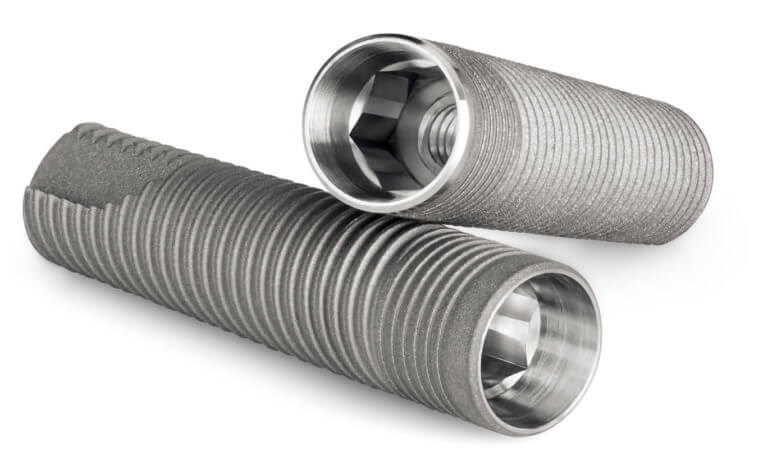
What Are The Alternative Treatments If I Do Not Choose Dental Implants?
While dental implants are a highly effective and popular choice for replacing missing teeth, they may not be the right option for everyone. Several alternative treatments are available, and your dentist will work with you to determine the most suitable solution based on your oral health, specific needs, and preferences.
- Removable Dentures: Removable dentures are one of the traditional and more cost-effective options for replacing missing teeth. These prosthetic appliances consist of artificial teeth set in a gum-colored base, and they are held in place either by natural suction or dental adhesives. Removable dentures can replace multiple missing teeth or an entire arch of teeth. They are convenient for cleaning and maintenance but may not offer the same stability and function as dental implants.
- Fixed Dental Bridges: Fixed dental bridges are an alternative option for replacing one or more missing teeth. A dental bridge consists of one or more artificial teeth (pontics) held in place by dental crowns attached to the adjacent healthy teeth. This restoration “bridges” the gap left by missing teeth, restoring aesthetics and function. While dental bridges are more stable than dentures, they require healthy neighboring teeth to support the crowns, which may involve modifying those teeth.
- Resin-Bonded Bridges (Maryland Bridges): Resin-bonded bridges, also known as Maryland bridges, are a conservative alternative to traditional fixed bridges. Instead of using dental crowns to hold the bridge in place, resin-bonded bridges are attached to the back of adjacent healthy teeth with metal or ceramic wings. This option requires minimal alteration of neighboring teeth, but it may not be as secure as traditional fixed bridges.
- No Treatment (Leave the Gap): In some cases, individuals may choose not to pursue any tooth replacement option, leaving the gap caused by the missing tooth as it is. While this may be a choice for some people, it can lead to various oral health issues, such as shifting of neighboring teeth, difficulty in chewing, and potential bone loss.
Choosing the most suitable tooth replacement option is a personalized decision that depends on various factors, including the number of missing teeth, the condition of adjacent teeth, and your overall oral health. While dental implants offer numerous advantages and stability, alternative treatments like dentures, dental bridges, or partial dentures may be more appropriate for certain individuals. Your dentist will carefully assess your unique situation, discuss the available options, and help you make an informed choice that best aligns with your preferences and long-term oral health goals. If you have further questions about Dental Implants, please contact us.
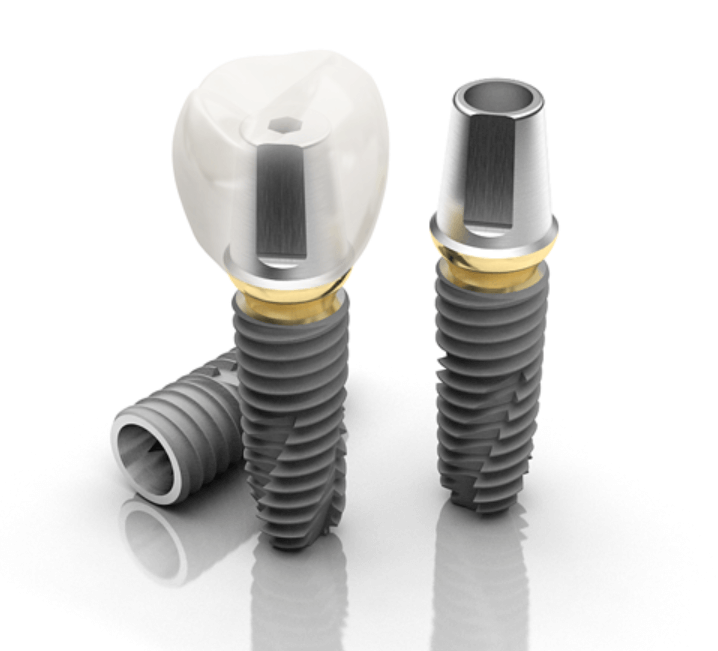
Cost of Dental Implant
A Dental Implant often involves multiple components and fees including tooth removal (code 71201), the dental implant placement (79931), bone grafting (72421) and the dental implant crown (27215). Therefore, depending on your needs, the cost of a single tooth dental implant can range between $4165 to $5222. The codes relevant to dental implants in the Ontario Dental Association’s Suggested Fee Guide appear as follows:
Removals, Erupted Teeth, Complicated
- 71201 – Removals, Erupted Tooth, Surgical Approach, Requiring Surgical Flap and/or Sectioning of Tooth: $307
Implants, Osseointegrated, Root Form, More than one component
- 79931 – Surgical Installation of Implant with Cover Screw – per implant: $1785+ Dental Materials Expense (approximately $350)
Alveolar Bone Preservation – Allograft
- 72421 – First tooth: $450 + Dental Materials Expense (approximately $300)
Crowns, Porcelain/Ceramic/Polymer Glass Fused to Metal
- 27215 – Crown, Porcelain/Ceramic/Polymer Glass Fused to Metal Base, Implant-Supported: $1280 + Dental Lab Fee + Dental Materials Expense (approximately $750)
In Ontario, most dentists will provide basic dental surgery and restorative dental services consistent with the Ontario Dental Association’s Suggested Fee Guide, such as dental emergency examinations, dental x-rays and tooth extractions, to ensure fair and competitive treatment cost. The Ontario Dental Association’s Suggested Fee Guide is a proposed fee structure that dentists in Ontario may or may not follow. Please consult with your dentist about fees before going ahead with treatment.
Each dental implant surgery case is unique. Depending on your unique circumstance, implant surgery may be more difficult and more expensive if any of the following is required:
- CBCT scanning
- Computer guided implant surgery
- Immediate implant placement following tooth extraction
- Bone grafting to prevent bone loss
- Bone regeneration to grow new bone
- Simultaneous gum graft procedures
- Immediate tooth replacement at the time of surgery
- Sinus lifting procedures to raise the maxillary sinus floor
Dental Implant services are usually considered a supplementary service by dental insurance plans and may or may not be covered by your dental insurance. Be sure to find out from your dental insurance plan provider how much you are eligible for before going ahead with dental treatment. Your dentist can help you submit an predetermination to your dental insurance.
For patients without dental insurance, Atlas Dental is pleased to offer dental financing through Dentalcard. Affordable payment plans start at 7.95% for terms of 6 months to 6 years. To learn more about Dentalcard dental treatment financing, follow this link.
What Are The Steps In The Dental Implants Procedure?
The dental implant procedure is a well-orchestrated process that involves multiple stages, each crucial to ensuring a successful and long-lasting outcome. From the initial consultation to the final restoration, your dental team will guide you through the journey, making your dental implant experience as comfortable and effective as possible. Let’s explore the step-by-step process of getting dental implants and uncover the transformative path to a radiant and functional smile.
- Initial Consultation and Treatment Planning: The first step in the dental implant procedure is a comprehensive consultation with your dentist or oral surgeon. During this appointment, your dental professional will thoroughly examine your oral health, take X-rays or CBCT 3D scans of your jawbone, and discuss your dental history and treatment goals. This evaluation is essential to determine if you are a suitable candidate for dental implants and to create a personalized treatment plan that addresses your specific needs. Computer guided dental implant surgery may be required in difficult implant sites. Before your visit, please read and follow our pre-operative instructions.
- Preparing the Implant Site: Before the implant placement, any remaining damaged or decayed teeth at the implant site will be extracted, if necessary. In some cases, bone grafting, indirect sinus lifting, or other procedures may be performed to augment the jawbone if there is insufficient bone density to support the implant.
- Implant Placement: The actual implant placement is a minor surgical procedure that is typically performed under local anesthesia. During the procedure, the dentist or oral surgeon will make a small incision in the gum to expose the jawbone. Then, a small hole is carefully drilled into the bone, and the implant post, usually made of biocompatible titanium, is inserted into the prepared site. The gum is then sutured closed, and the healing process begins. After receiving your dental implant, please read and follow our post-operative instructions to ensure proper healing.
- Osseointegration: After the implant is placed, the process of osseointegration begins. Over the next several weeks or months, the implant post fuses with the jawbone, creating a strong and stable foundation for the dental restoration. During this healing period, a temporary restoration may be provided to maintain aesthetics and function.
- Attaching the Abutment: Once osseointegration is complete, the gum is reopened to expose the implant post. An abutment, a small connector piece, is attached to the implant. The abutment will serve as the anchor to which the final dental restoration will be secured.
- Dental Restoration Placement: After the abutment is in place, your dentist will take impressions of your mouth to create your custom dental restoration, such as a dental implant crown, dental implant bridge, or denture. These restorations are meticulously designed to match the shape, size, and color of your natural teeth, ensuring a seamless and aesthetically pleasing smile. Once the restoration is ready, it will be attached securely to the abutment, completing your new smile.
- Follow-Up Care and Maintenance: After the dental implant crown procedure is complete, your dentist will provide you with post-insertion care instructions. It is crucial to follow these guidelines diligently to promote proper healing and minimize the risk of complications. Regular dental check-ups, professional cleanings, and good oral hygiene practices are essential to maintaining the health and longevity of your dental implants.
The dental implant procedure is a carefully orchestrated process that offers a transformative solution for missing teeth. From the initial consultation to the final restoration, your dental team will guide you through each stage, ensuring your comfort and satisfaction at every step. Dental implants provide a durable, natural-looking, and functional replacement for missing teeth, allowing you to reclaim your smile and enjoy life with newfound confidence and ease. If you have further questions about Dental Implants, please contact us.
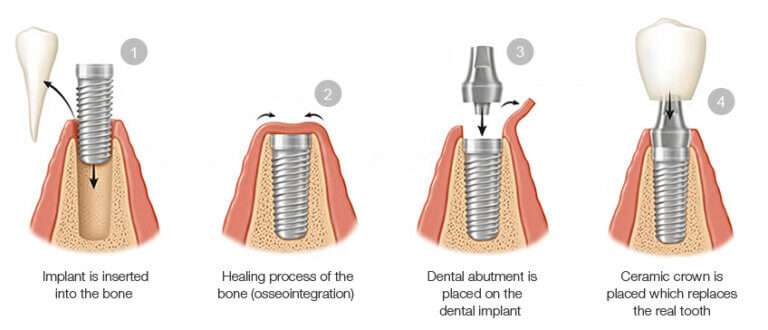
Can I Have Dental Implants If I Am Pregnant?
Pregnancy is a special time when maintaining overall health and well-being is of utmost importance, including dental health. Dental concerns during pregnancy may arise, leading to questions about whether dental implant treatment is safe for expectant mothers. Let’s explore the considerations regarding dental implants during pregnancy and how to prioritize dental care for both the mother and the baby.
- The Safety of Dental Implant Surgery: Under normal circumstances, dental implant surgery is considered safe and successful for most individuals. However, during pregnancy, elective dental procedures are generally deferred to avoid potential risks to the developing baby. The first trimester is a critical period for fetal development, and it is recommended to avoid any non-urgent dental treatments during this time.
- Timing of Dental Implant Treatment: If you require dental implant treatment and are already pregnant, your dentist will likely advise postponing the procedure until after delivery. The second trimester is often considered the safest time for elective dental work if necessary, as the risk of potential harm to the baby is lower during this period. However, it is essential to consult with your obstetrician and dental professional to assess your specific situation and weigh the risks and benefits carefully.
- Managing Dental Issues During Pregnancy: While dental implant surgery may be postponed, it is essential to address any dental issues that may arise during pregnancy promptly. Hormonal changes during pregnancy can lead to increased susceptibility to gum disease and dental problems. Regular dental check-ups, professional cleanings, and maintaining good oral hygiene are crucial during pregnancy to ensure optimal oral health for both the mother and the baby.
- X-Rays and Medications: During pregnancy, X-rays and certain medications should be used with caution and only when absolutely necessary. If dental X-rays are required for diagnostic purposes, special precautions, such as using lead aprons to shield the abdomen and thyroid, will be taken to minimize exposure to the developing baby.
- Anesthesia Considerations: If dental treatment is necessary during pregnancy, local anesthesia is generally considered safe. However, it is best to avoid general anesthesia, especially during the first trimester. Your dentist will use the lowest effective dose of local anesthesia to ensure your comfort while safeguarding the well-being of both you and your baby.
During pregnancy, dental health remains an essential aspect of overall well-being. While dental implant surgery is typically postponed until after delivery, addressing any dental concerns promptly is crucial to ensure a healthy smile during this special time. It is essential to communicate openly with your dental professional and obstetrician. They will work together to create a personalized dental care plan that aligns with your pregnancy and oral health needs. If you have further questions about Dental Implants, please contact us.
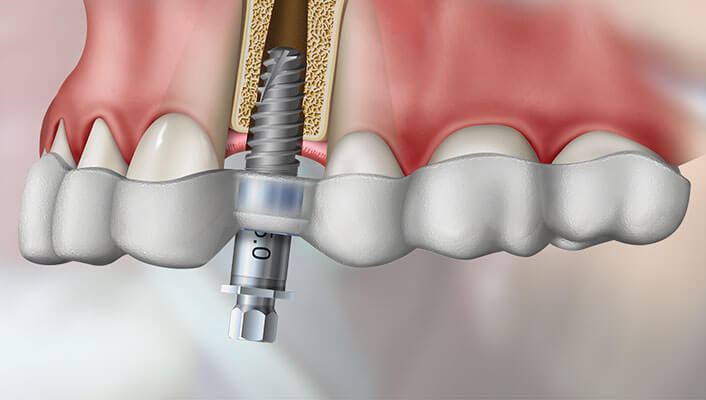
How Long Do Dental Implants Last
The lifespan of dental implants can vary depending on various factors, including the individual’s oral hygiene practices, overall health, and the quality of the implant procedure. In general, dental implants have a high success rate and can last for many years, and in some cases, a lifetime with proper care and maintenance.
Studies have shown that dental implants have a success rate of over 95% after ten years, and many implants last for much longer. However, it’s essential to understand that no dental restoration can guarantee a lifetime of use, and some implants may experience complications or require replacement over time.
To maximize the longevity of dental implants, it’s crucial to:
- Practice Good Oral Hygiene: Regular brushing, flossing, and dental check-ups are essential to maintaining healthy gums and supporting the long-term success of dental implants.
- Avoid Habits That Can Damage Implants: Chewing on hard objects, using teeth as tools, and clenching or grinding teeth (bruxism) can place excessive stress on dental implants, potentially leading to complications.
- Visit Your Dentist Regularly: Regular dental check-ups allow your dentist to monitor the health of your implants and address any concerns early on.
- Follow Post-Operative Care Instructions: After implant placement, following your dentist’s post-operative care instructions will help ensure proper healing and reduce the risk of complications.
- Manage Systemic Health Conditions: Certain medical conditions, such as uncontrolled diabetes or autoimmune disorders, can affect the success of dental implants. Managing these conditions in collaboration with your healthcare providers can be beneficial.
- Avoid Smoking: Smoking has been linked to a higher risk of implant failure. If you are a smoker, quitting can improve the long-term success of your dental implants.
It’s important to note that individual responses to dental implants can vary, and some factors beyond your control may affect the lifespan of your implants. If you experience any issues with your dental implants, such as pain, swelling, or a loose implant, it’s crucial to contact your dentist promptly for evaluation and appropriate treatment. If you have further questions about Dental Implants, please contact us.
We also think you’ll like…
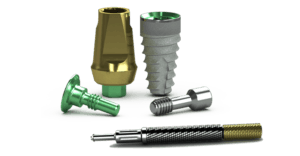
Biohorizons Dental Implants
Biohorizons Dental Implants What Are BioHorizons Dental Implants? BioHorizons is a prominent dental implant company known for its expertise in the design, manufacture, and distribution
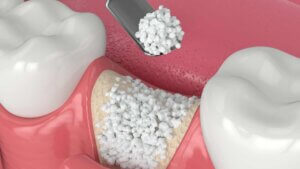
Bone Graft Post-Operative Instructions
Bone Graft Post-Operative Instructions What You Should Do After Your Dental Bone Graft Surgery Alveolar bone preservation is a dental procedure that involves placing a bone
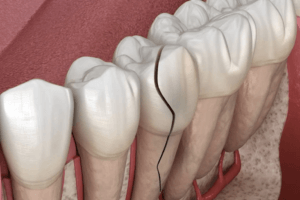
Crack Tooth Syndrome
Crack Tooth Syndrome What Is Crack Tooth Syndrome? Are you experiencing dental pain but your dentist has told you there is no obvious sign of
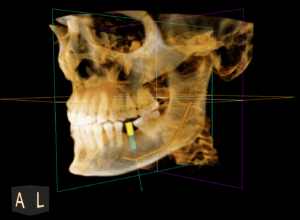
CBCT Scan
CBCT Scan What Is A CBCT Scan? Advanced imaging technologies have revolutionized the way dental professionals diagnose and treat various oral conditions. One such groundbreaking
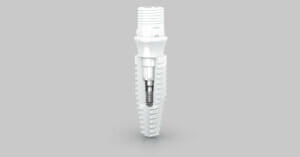
Zirconia Dental Implants
Zirconia Dental Implants What Are Zirconia Dental Implants? Zirconia dental implants are an alternative to traditional titanium dental implants for replacing missing teeth. Unlike titanium
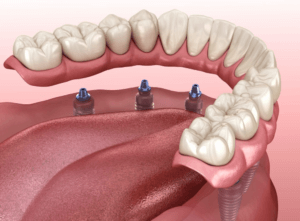
Implant Denture
Implant Denture What Is An Implant Denture? An Implant Denture, also known as an implant-supported overdenture, is a dental appliance designed to restore missing teeth

